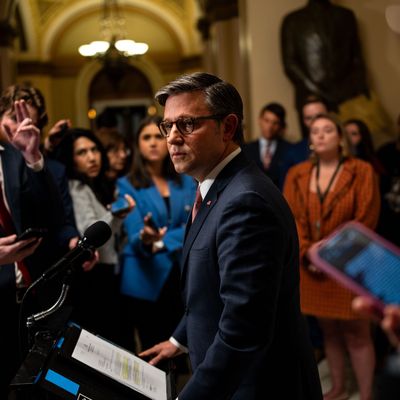
If you listen to Donald Trump talk, you’d figure his main priorities if elected in November are to punish his many enemies and to begin deporting the undocumented immigrants he claims are destroying the country. If you watch his campaign ads, it seems protecting America from the phantom menace of transgender athletes is front of mind for MAGA folk. But if you listen to what congressional Republicans are saying when they fantasize about a legislative agenda for 2025, it’s all about “money, money, money,” and especially tax cuts.
If Trump wins, the odds are better than average that he will bring in a Republican-controlled Congress with him (the Senate is all but in the hands of the GOP already, and the House usually follows the presidential results). So it’s entirely in order for Trump’s congressional allies to begin planning what they will do with a governing “trifecta,” the first they would enjoy since they lost the House in 2018. NOTUS talked to House GOP second-in-command Steve Scalise, and he was pretty clear about job one:
House Majority Leader Steve Scalise told NOTUS on Monday that, in the first 100 days, Republicans are looking to pass a package through budget reconciliation that would cut taxes and provide new funding for a border wall.
“I’ve already talked to President Trump about the top priorities he would want,” Scalise said during an interview at the border.
You may recall that in 2017, when they were last in this situation, Republicans tried to pass two budget-reconciliation bills (which cannot be filibustered in the Senate). The first was aimed at killing Obamacare and enacting some other budget cuts, mostly in programs benefiting the poor, and the second was focused on high-end tax cuts. The first bill notoriously failed after repeated efforts to pass it, thanks to the inability of Senate Republicans to keep their own conference in line; the second was enacted late in 2017. It looks like this time around Republicans will serve dessert first, before considering an entrée aimed at crippling the hated welfare state, or at least the especially hated Obamacare initiative. Per NOTUS:
Asked about including reforms to Obamacare in budget reconciliation — Sen. Tom Cotton has suggested passing tax cuts and a health care overhaul in one package, raising the prospect that cutting Obamacare subsidies could be used to offset tax cuts — Scalise was less resolute on health care reforms than other items.
“The main things we’ve been talking about is getting the economy back on track and securing the border,” he said. “Of course, those are the top issues right now. I’m sure we’ll get into, you know, helping lower the cost of health care, addressing transparency in health care, which doesn’t exist right now.”
Scalise also went on to make the ancient supply-side economics argument that moving tax cuts first would not make the budget deficit worse because tax cuts pay for themselves with higher revenues (it’s totally not true, but it remains GOP orthodoxy). But voices on Wall Street are already being raised warning both parties that further indifference to debts and deficits will produce a big market backlash, as CNBC reports:
Billionaire hedge fund manager Paul Tudor Jones is raising alarms about the U.S. government’s current fiscal deficit and the increased spending promised by both presidential candidates, saying the bond market may force the government’s hand after the election in addressing it.
“We are going to be broke really quickly unless we get serious about dealing with our spending issues,” Jones told CNBC’s Andrew Ross Sorkin on Tuesday.
Spending cuts, and especially reductions in the entitlement spending that is usually the object of budget-reconciliation bills, are political trip wires. But then again, Trump will have waged his last election campaign if he’s back in the White House and may not care a great deal whether his party is pursuing unpopular initiatives. We will probably get a good indication of how serious congressional Republicans are about using their power to serve up piping hot platefuls of budgetary broccoli during the postelection lame-duck session of Congress, when stopgap spending authority runs out and the GOP and the new administration would be expected to tip their hands on fiscal policy. Among other things, we’ll see if the administration Trump is pulling together is more focused on firing disloyal “deep state” federal employees or demolishing the programs and agencies that employ them.
More on politics
- Trump Ambassador Picks: Who’s in His ‘Diplomatic Clown Car’
- What We Learned From the House Ethics Report on Matt Gaetz
- Everyone Biden Has Granted Presidential Pardons and Commutations






























